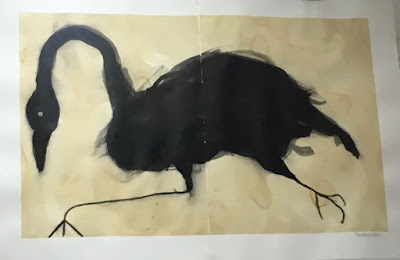"I want to say a word or two about black swans and the election. A black swan is a term for something rare but consequential that may look obvious in retrospect but comes as a surprise at the time it happens. And these rare birds seem good to keep in mind as we approach this election. Four years ago at this time, Hillary Clinton's chances of winning were about 85% and a lot of people assumed that 85% was the same thing as 100%, and a lot of people confident she was going to win moved right on to fighting her as though she had won or stayed home because they assumed they knew she'd win. And then she didn't. Leaving aside the fact that it was an election so corrupted it should've been nullified, and that she won the popular vote even with massive voter suppression--we've been living in the world of the 15% ever since, and it's felt like some sort of alternate reality hell realm.
In my work on hope I've often focused on the welcome black swans: the uprisings of 1989 that led to the collapse of the Soviet client states, the series of events that changed Nelson Mandela's destiny from life in prison to president of a post-Apartheid South Africa, the rise of the Zapatistas in 1994 and the new political visions they gave us, the way Standing Rock became, from the starting point of a few people taking a stand, a huge event for climate justice, Native American visibility and rights, an inspiration to indigenous and to non-indigenous people, and an instigation to Alexandria Ocasio-Cortez to run for office when her chances looked very slim and most "experts" would have advised her against even trying. She is the loveliest of black swans. But not all black swans are your friends and heroes.
The tricky thing about hope is to not confuse it with optimism. Optimism is confidence that you know the future and it requires nothing of you. It's a mirror image of pessimism, which likewise assumes it knows the future, only pessimism's future is dismal and not up to us either. Hope is a sense of possibility within the uncertainty of a future that does not yet exist, but that we are making by our actions (and yeah, they are making by theirs).
The future needs us. It needs us in the present to choose through powerful action the best version, rather than allowing the worst to overtake us. We act as though the future is predictable, as though it travels in easily measured increments that don't startle us, as though all the swans that fly across our sky are white. But black swans happen, and they happen often. Which is why I've modified the old, hope for the best, prepare for the worst to: Hope for and work the best (and also be prepared to wrestle with the worst if it arises, and there too there might still be something to hope for, including victory).
I'm writing today to urge everyone to keep making the future we need, to neither feel so defeated it's not worth trying nor so confident that it seems unnecessary to try. To doctors, a 15% chance of getting a terrible or terminal disease puts you in a high-risk group. And yet in politics people presume an 85% chance is smooth sailing ahead. Things are actually looking good for a crushing defeat of Trump, but we all need to keep crushing, to defend a free and fair election, and to be prepared for the worst: a coup attempt that I believe we can, in sufficient numbers, crush. We do not know what is going to happen; we do know it is in part in our hands. That we ourselves are sometimes the swans flying across the sky of our own deepest hopes.
Black swans: that's part of why I've used this exquisite painting (porly photographed) by Selena Perez of Creativity Explored as my backdrop for a lot of my Zoom appearances. (Also because it's beautiful and powerful and we might as well look at art while we spend too much time online.) And part of what I'm doing for this election is trying to offer anyone who comes here daily hope, as news, as observations, as history, and as, well, today, Sunday, homily. And swannery."
Rebecca Solnit
via {rebecca solnit}


0 comments:
Post a Comment